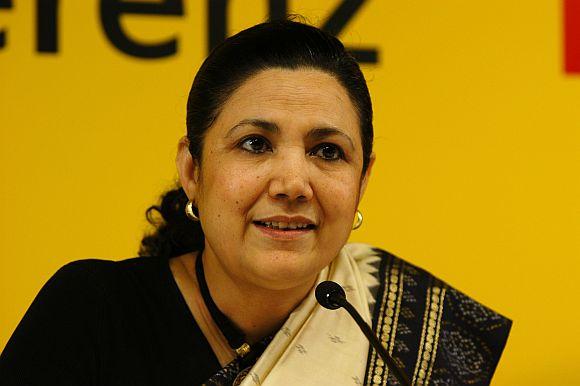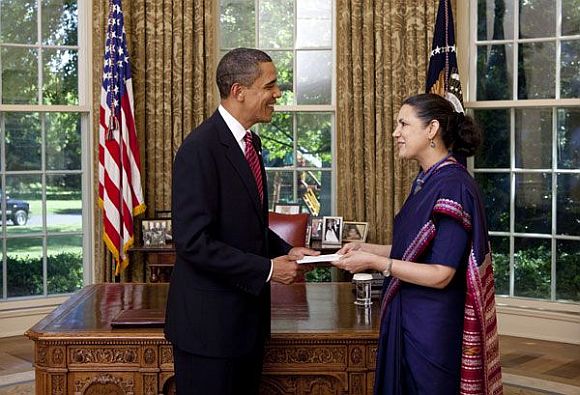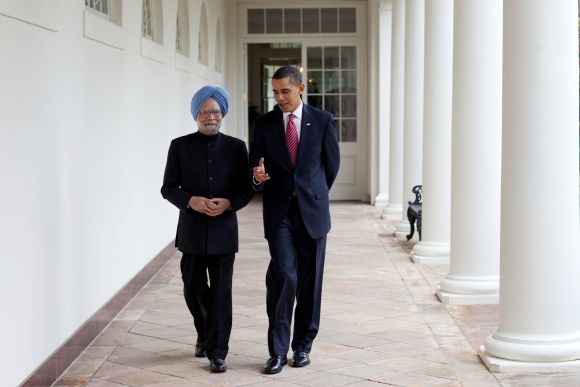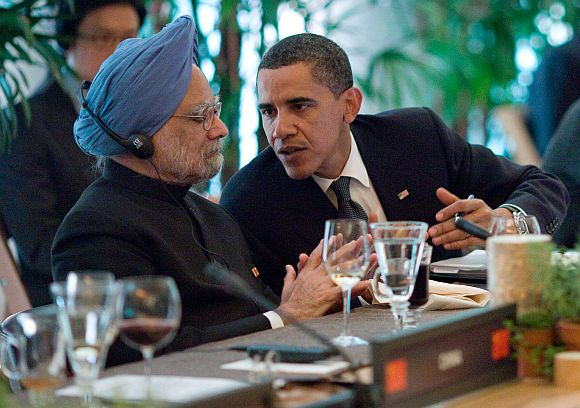Bikash Mohapatra
Rediff.com's Bikash Mohapatra, who witnessed the historic re-election of Barack Obama as president, talks to former Indian Ambassador to the US Meera Shankar about the future of the ties between the two democracies
With Barack Obama being elected for a second term as United States President, India can expect a continuation of the process that started in the first.
The bilateral relationship between the US, the world's oldest democracy, and India, the world's largest democracy, has held firm among turbulent periods and is on the way forward.
The process, which began with President Bill Clinton, was built upon by President George W Bush (in his two terms), and carried forward by President Obama.
In fact many experts opine if there is one thing in an increasingly partisan Washington, it is a common ground on building cooperation with India.
"We have a strategic partnership now which is pretty broad based. We have expanded cooperation to new areas. We have also our trade and economic relationships grow to $100 billion, and there are prospects of it growing further," explained Meera Shankar, India's ambassador to the United States between 2009 and 2011.
...
India & US: Focus on convergence, handle divergence
"I will not say that it is driven by the partisan politics of the US. It is an issue in which both the parties are in broad agreement," she added, before proceeding to elaborate on her point.
"In fact when I was there and Democrats and the Republicans couldn't agree on how to handle issues such as fiscal deficit, debt, taxation and health care," she continued, adding, "In a situation of increasing contradiction, the one issue on which they would agree without hesitation was the relationship with India. And I think that was an enormous strength because it is not just based on our shared values but on our increasingly convergent interests, in the wider Asian region and internationally as well."
The bilateral relations between the countries received a fillip during Obama's first stint when he visited India in November, only the second US President -- after Richard Nixon in 1969 -- to do so in his first term.
...
India & US: Focus on convergence, handle divergence
Image: Obama with Prime Minister Manmohan SinghPhotographs: White House Photos
With the US suffering its worst economic recession since the 1930s, the Obama administration looked towards the Asia-Pacific region with renewed interest, a move welcomed by India.
"I think for Asia the key issue is regained momentum in the US economy because the US is so much of an engine in the global economy, and the world is so interconnected, that they are seeing that anemic recovery in the US and prolonged economic crisis in Europe is having an impact on the Asian economies also -- we have seen a moderation of growth in both China and India," explained ambassador Shankar.
"So from our point of view I think it we would be deeply interested in seeing that the two countries are able to put aside their partnership on economic issues and find common ground in a way that enables the US to regain the economic energy which it has always had," she added.
Despite renewed interest in economic cooperation there are areas of conflict that still exist, the protectionist policies of the US adding to the woes.
"The US obviously would like to have a broad-based economy just as we would like to have one, which is not just dependent on services but also has manufacturing," explained ambassador Shankar, before proceeding to elaborate on her point.
...
India & US: Focus on convergence, handle divergence
Photographs: White House Photos
"The question is how much of that will happen, because business people don't take decisions on what countries wish but on factors of competitive advantage," she continued, adding, "There's concern on this count in India that the protectionist rhetoric in the US doesn't translate into protectionist policies. For example, we have seen on the visa side that the US steeply increased fee for the H1-B and L1 workers going to the US and it has hit Indian companies hard."
"There's also been an increase in the number of visa denials which makes things more difficult. I think protectionism won't take the world forward especially if you are in a difficult situation."
Having said that the diplomat admitted that despite the differences the two countries could still move forward in the same direction.
"Like any two countries we can't agree on all issues," she admitted.
"But it is important to handle the divergent perspectives, where they exist, with maturity and with a view to see where we have a convergence and how we handle the divergence," she added.
Click on NEXT to go further...





article